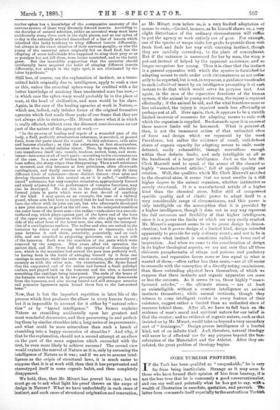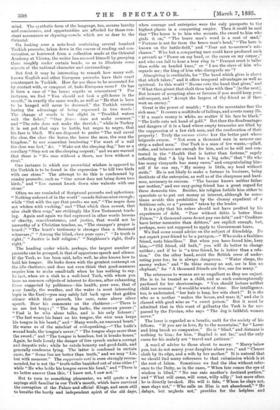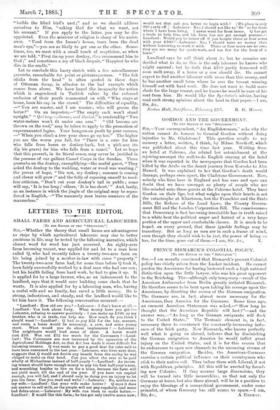SOME TURKISH PROVERBS.
IF the Turk has been qualified as " unspeakable," he is very far from being inarticulate. Strange as it may seem to those who have formed their opinion of him from hearsay, if is not the less true that he is commonly a good conversationalist, and can say well and pointedly what be has got to say, wits a wealth of illustration in anecdote, quotation, and proverb. The latter form commends itself especially to the sententious Turkish
mind. The synthetic form of the language, too, secures brevity and conciseness, and opportunities arc afforded for those constant assonances or rhyming-vowels which are so dear to the Oriental.
On looking over a note-book containing several hundred Turkish proverbs, taken down in the course of reading and con versation, or borrowed from a collection made at the Oriental Academy at Vienna, the writer has amused himself by grouping them roughly under certain heads, so as to illustrate some aspects of the national character and surroundings.
But first it may be interesting to remark how many wellknown English and other European proverbs have their exact counterpart in Turkish. How far are these to be accounted for by contact with, or conquest of, Indo-European races ? Or has it been a case of " les beaux esprits se rencontrent "? For instance, we find " You should not look a gift-horse in the mouth," in exactly the same words, as well as " He that is born to be hanged will never be drowned," the Turkish version having the advantage of being expressed in two words !
The change of words is but slight in "Troubled waters suit the fisher," "One flower does not make summer,"
and " The robe does not make the dervish ; " while in Turkey it is not pot that says to kettle, but negro to negro, that his face is black. We are disposed to prefer "The nail saved the shoe, the shoe the horse, the horse the man, the man the kingdom," to our somewhat lumbering "For want of a nail the shoe was lost," &c. " Wake not the sleeping dog," has as a corollary " Step not on the sleeping serpent; " and we are warned that there is " No rose without a thorn, nor love without a rival."
One instance in which our proverbial wisdom is opposed to the Turkish is to be found in the expression " to kill two birds with one stone." The attempt to do this is condemned by sundry proverbs, such as " One arrow does not bring down two birds," and " You cannot knock down nine walnuts with one stone."
Often we are reminded of Scriptural proverbs and aphorisms. " Nothing unheard of in the world" sounds Solomonian enough ; while "Out with the eye that profits me not," "The negro does not whiten with washing," and "That which thou sowest, that also shalt thou reap," are strikingly like New Testament teach ing. Again and again we find expressed in other words lessons of charity, considerateness, and justice, that would not be unworthy of a Christian teacher, as, "The stranger's prayer is heard ;" "The heart's testimony is stronger than a thousand witnesses ;" " Among the blind, close your eyes ;" " In truth is right ;" " Justice is half religion ;" " Neighbour's right, God's right."
The heading under which, perhaps, the largest number of proverbs can be grouped, is that of opportune speech and silence.
If the Turk, as has been said, talks well, he also knows how to hold his tongue. He looks down with the greatest contempt on the idle chatterer, and does not even think that good-manners require him to make small-talk when he has nothing to say.
In fact, when on a visit to a well-bred Turk, with whom you have no common subjects of interest to discuss, after exhausting those suggested by politeness—his health, your own, that of your family, the weather, and the water (a most interesting topic in the East)—you may safely fall back upon that golden silence which their proverb, like ours, rates above silver speech. Hear his comments on the chatterer :—" There is no ass but brays ;" " The dog barks, the caravan passes ;" "Fool is he who alone talks, and is his only listener ;" " The fool wears his heart on his tongue, the wise man keeps his tongue in his heart ;" and " Many words, an unsound heart."
He warns us of the mischief of evil-speaking,—" The knife's wound heals, the tongue's never ;" " The tongue slays more than the sword ;" and "The tongue is boneless, but it breaks bones."
Again, he feels keenly the danger of free speech under a corrupt and despotic rule; while he extols honesty and good-faith, and generally condemns lying. The latter is condoned in certain cases, for " Some lies are better than truth," and we may " Lie, but with measure." The suppresaio veri is even strongly recommended, for is not the " truth-teller banished out of nine cities ?" while "He who holds his tongue saves his head," and "There is no better answer than this, I know not, I saw not."
But to turn to something pleasanter, we will quote a few sayings still familiar in our Turk's mouth, which have survived the corruption of the Palace and official Kings, and seem still to breathe the hardy and independent spirit of the old. days, when courage and enterprise were the only passports to the highest places in a conquering empire. Then it could be said that "The horse is to him who mounts, the sword to him who girds it on," " The brave man's word is a coat of mail," "Fortune is not far from the brave man's head," "The hero is known on the battle-field," and " Fear not to-morrow's mis chance." Who but a conquering race could have produced such a proverb as " Power on my head, or the raven on my corpse ;" and who can fail to hear a true ring in " Peasant erect is taller than noble on bended knee," or " I am the slave of him who regards me ; the king of him who disregards me "P Almsgiving is creditable, for "The hand which gives is above that which takes ;" and it offers temporal advantages as well as spiritual. In this world " No one cuts the hand that gives," and " What thou givest that shalt thou take with thee " [to the next]. But beware of accepting alms or favours if you would keep your self-respect, and "Accept the largess of thy friend as if thou wert an enemy."
Great is the power of wealth ; "Even the mountains fear the rich man." It covers a multitude of failings, and averts many ills.
" If a man's money is white, no matter if his face be black."
" The knife cuts not hand of gold." But then the disadvantages and dangers of it in a land where empty treasuries are filled by
the suppression of a few rich men, and the confiscation of their property ! Truly the vacuus vialor has the better part where brigands swarm. " Not even a thousand men in armour can strip a naked man." Our Turk is a man of few wants,—pilaff, coffee, and tobacco are enough for him, and so he will rest contented in the "Health that is better than fortune," sagely reflecting that " A big head has a big ache," that "He who has many vineyards has many cares," and congratulating him
self if he can say, "My money is little, my head without strife." He is not likely to make a fortune in business, being destitute of the enterprise, as well as of the sharpness and hard ness, necessary to success. " The bazaar knows neither father nor mother," and our easy-going friend has a great regard for these domestic ties. Besides, his religion forbids him either to speculate or to put out money at interest, although he sometimes avoids this prohibition by the clumsy expedient of a fictitious sale, or a " present " taken by the lender.
It is a pity that his rulers should not have profited by his experiences of debt. " Poor without debts is better than Prince," " A thousand cares do not pay one debt," and " Creditors have better memories than debtors," are explicit enough, but, perhaps, were not supposed to apply to Government loans.
We find some sound advice on the subject of friendship. Do not expect your friend to be a paragon,—" Who seeks a faultless friend, rests friendless." But when you have found him, keep him,—" Old friend, old bath," you will do better to change neither; and if he is "a true friend, he is better than a rela tion." On the other hand, avoid the British error of underrating your foe; he is always dangerous. "Water sleeps, the enemy wakes," and " Be thine enemy an ant, see in him an elephant," for "A thousand friends are few, one foe many."
The references to woman are as ungallant as they are unjust. She is to be treated as a child, and as such contemptuously pardoned for her shortcomings. " You should lecture neither child nor woman ;" it would be waste of time. Her intelligence, too, is underrated, " her hair is long, her wits short !" It is she who as a mother " makes the house, and mars it," and she is classed with good wine as "a sweet poison." -But it must be admitted that in this want of gallantry the Turk is far surpassed by the Persian, who says "The dog is faithful, woman never."
The lover is regarded as a lunatic, unfit for the society of his fellows. " If you are in love, fly to the mountains," for " Lover and king brook no companion." He is " blind," and distance is nothing to him ; for him, " Bagdad is not far," and the only cures for his malady are " travel and patience."
A word of advice to those about to marry. " Marry below you, but do not marry your daughter above you ;" and " Choose cloth by its edge, and a wife by her mother." It is natural that we should find many references to that submission which is at the root of Islam. Sometimes we find the idea without reference to the Deity, as in the cases, "When fate comes the eye of wisdom is blind," " No one eats another's destined portion," and " What will come, will come, willy nilly ;" but more often he is directly invoked. His will is fate, " Whom he slays not, man slays not," " Who calls on Him is not abandoned," " He delays, but neglects not," provides for the helpless and
" builds the blind bird's nest ;" and so we should address ourselves to Him, "asking God for what we want, not his servant." If you apply to the latter, you may be disappointed. Even the minister of religion is chary of his assistance. " Food from the Imam's house, tears from the dead man's eye,"—you are as likely to get one as the other. Sometimes, too, we meet with a small touch of scepticism, us when we are told, "First tie-up your donkey, then. recommend him to God ;" and sometimes a cry of black despair," Happiest he who dies in the cradle."
Let us conclude this hasty sketch with a few miscellaneous proverbs, remarkable for point or picturesqueness. " The fish stinks from the head " is often quoted in these days of Ottoman decay, in allusion to the bad example which comes from above. We have heard the incapacity for action which is engendered in Turkish rulers by the enforced seclusion of their youth commented on with " Who stays at home, loses his cap in the crowd." The difficulties of equality, — " You are master, and I am master ; who will groom the horse ?" On an impostor,—" The empty sack won't stand upright." " Qui trop caibrasse, mal etreint," is rendered by " Two water-melons won't fit under one arm." " Old brooms are thrown on the roof," may be taken to apply to the promotion of superannuated fogies. Your hangers-on profit by your success,
— " When you climb a tree your shoes go up too." The higher you are the worse you fall, for " There is a cure for him who falls from horse or donkey-back, but a pick-axe (to dig his grave) for him who falls from a camel." Let us hope that this proverb, in its literal sense, may never be justified in the persons of our gallant Camel Corps in the Soudan. Three proverbs on the donkey, exemplifying—the useful guest, "They asked the donkey to the wedding, water or wood was wanting ;" the power of hope, "Die not, my donkey ; summer is coming and clover will grow ;" and the folly of exposing oneself to needless criticism, "Don't cut your donkey's tail in public ; some will say, It is too long ; others, 4It is too short.'" And, lastly, as an instance in which the jingle of the original may be reproduced in English,—" The mannerly man learns manners of the mannerless."
















































 Previous page
Previous page